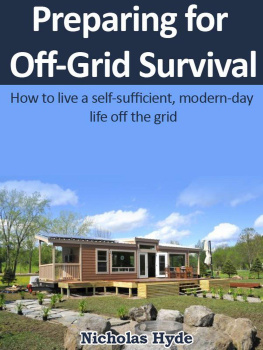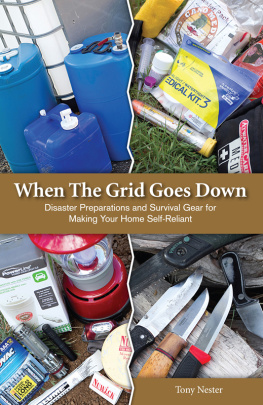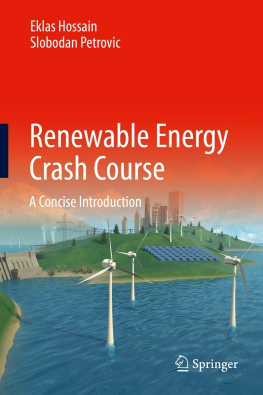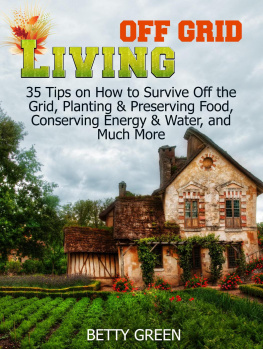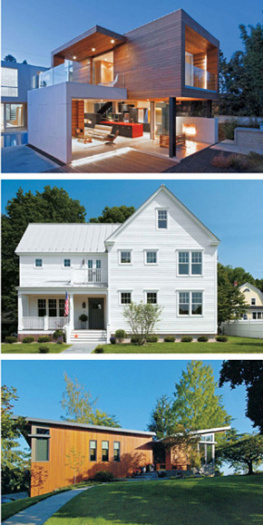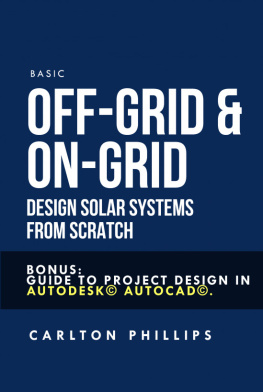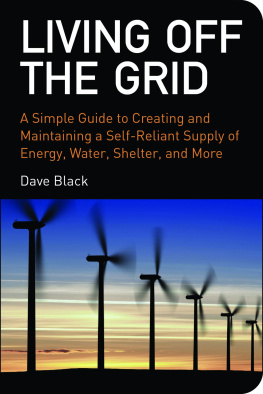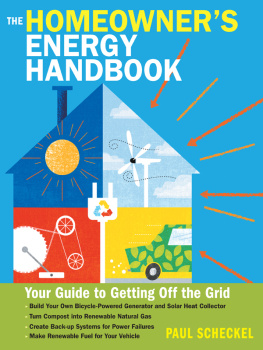Preparing for Off-Grid Survival
How to live a self-sufficient, modern-day life off the grid.
Nicholas Hyde
2012 by AndrewKaschPublishing.com
All Rights Reserved. No part of this publication may be reproduced in any form or by any means, including scanning, photocopying, or otherwise without prior written permission of the copyright holder.
Disclaimer and Terms of Use : The Author and Publisher have strived to be as accurate and complete as possible in the creation of this book, notwithstanding the fact that he does not warrant or represent at any time that the contents within are accurate due to the rapidly changing nature of the Internet. While all attempts have been made to verify information provided in this publication, the Author and Publisher assume no responsibility for errors, omissions, or contrary interpretation of the subject matter herein. Any perceived slights of specific persons, peoples, or organizations are unintentional. In practical advice books, like anything else in life, there are no guarantees of personal results. This book is not intended for use as a source of legal, business, accounting, medical, or financial advice. All readers are advised to seek services of competent professionals in the legal, business, accounting, medical, and finance fields. Furthermore, what works for some people may not work for others. Following the advice given in this book may result in unintended consequences in your life and the author and publisher assume no responsibility for that. Pursue the contents of this book at your own risk.
Table of Contents
I t is possible to live a comfortable lifestyle residing in the convenience of modern accommodations without being dependent upon utility companies and government services. Situating yourself into a completely self-reliant existence has affectionately become known as living off the grid . That terminology, however, is a bit misleading. Most people who are interested in self-sufficient living are not trying to hide from anybody. They simply see advantages to this type of life, which might include:
Preparation for an economic collapse of society
Living in a scenic, rural area of their choice
Fulfilling a desire for returning to an era of simpler living
Escaping modern society, seeking seclusion
Ending utility bills and dependence on public works
A fun project for someone with too much money/time
...among others. For some, the necessity of establishing living quarters in a rural area that is not accessible by normal services forces the issue (for example, building a fishing or hunting cabin on a specific piece of land). For others, off-grid living has simply become a way of life. After the Grateful Dead stopped touring, they realized they would need to buy a cheap lot somewhere to park their bus on, and consequently needed appropriate ways to handle waste management and power the falafel grill. Still others think the battle of Armageddon will be fought in Montana or something, and are building a self-sufficient compound with more rounds of ammunition stored than some small countries have.
Whatever your personal reasons, you are not alone. Going off the grid is starting to become downright trendy. There is just something about providing yourself with your own food and water that nurtures the American spirit. Cooking dinner in a modern-style kitchen and then watching a movie afterwards on a big home-theatre system, with no utility bill to have to pay for it afterwards, somehow makes one feel more in touch with nature. Home-schooling is more meaningful when gym class includes toting a shotgun into the brush for a grouse hunt.
Lets face it - with all the cool technological perks modern society offers, it also leaves a person feeling empty at times. We can begin to suspect that life has gotten out of balance. We realize we work too hard, and dont spend enough time on wood carvings and fence-mending. Many of us are beginning to sense this, and have started looking to nature for an escape. Buying a beautiful piece of land far from any utility services is usually quite affordable, because most people have no use for such a thing. There you can start an exciting new project which is truly satisfying. It will eventually become both a vacation abode and retreat from society. Your self-sufficient sanctuary will be there for you, should the grid ever shut down. Thats nice.
In the following pages, we will examine the primary concerns anyone interested in off-grid survival will need to address. Fortunately, by now other pioneers have blazed this trail quite visibly, which means we can learn from those who know what they are doing and dont have to try and reinvent the wheel. We will get you setup with housing, power, water, and food sources. We will address transportation and security considerations. Finally, we will take a serious look at providing quality off-grid education for your kids, and even discuss how you can have a healthy social life. There is no need to grow a long beard and get all uni-bomber on us; in fact, off-grid survival might just end up being a more fulfilling life than the one you are currently living.
L iving off the grid usually entails getting away from major cities entirely, in search of an affordable plot of land which wont have any zoning issues in regards to digging wells, building windmills, and installing septic tanks. Climate is a consideration as well. Land at higher elevations is usually more suitable for an off-grid lifestyle in terms of affordability and privacy. Washington and Oregon are popular destinations, as is Colorado. The winters in Colorado are not suitable for most people, however, and can seriously interfere with construction projects. Land in desert areas such as Arizona, New Mexico, and Texas is often very affordable, but only suitable for some types of people. Lack of scenery, unbearable summer heat, and toothless neighbors is not a scenario for everybody.
Additional considerations when seeking a location may include the amount of sun the land receives (for potential solar panel usage and gardening benefits), what kind of water can be naturally acquired in the area without digging a well, and soil nutrients. If you have the proper amount of sun, water, and healthy soil, you can go far. Moving into a location lacking in any of these areas isnt necessarily a bad thing; it just means you will have a lot more work to do.
Once you have found a suitable plot of land, you will need to research housing options. Parking a trailer on it in the meantime is a good way to start, as it lets people in the area know the spot is occupied. If you plan on doing the construction yourself, you should build some kind of basic shelter right off the bat, which will protect the materials you will be hauling up there. This can be a simple carport covering to keep the rain off of them. Otherwise, it is time to start shopping nearby construction companies. Many contractors in rural areas dont have websites, so you should inquire at the real estate offices in the closest towns.
Next page
